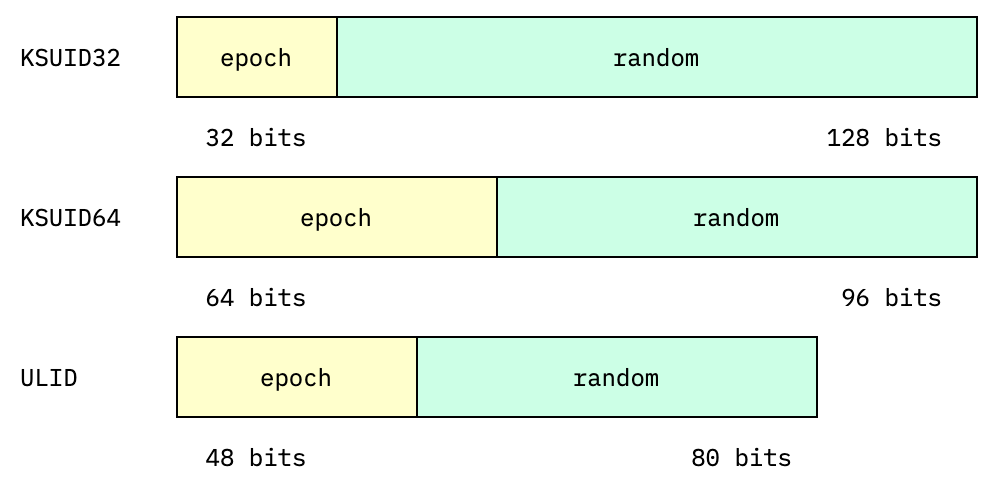



[!NOTE]
This is one of 198 standalone projects, maintained as part
of the @thi.ng/umbrella monorepo
and anti-framework.
🚀 Please help me to work full-time on these projects by sponsoring me on
GitHub. Thank you! ❤️
About
Configurable K-sortable unique IDs, ULIDs, binary & base-N encoded, 32/48/64bit time resolutions.
Idea based on segmentio/ksuid, though the
added flexibility in terms of configuration & implementation also enables the
creation of ULIDs:
| Feature | KSUID default | ULID default |
|---|
| Configurable bit size | 160 bits | 128 bits |
| Base-N encoding scheme | base62(1) | base32 (Crockford) |
| Timestamp resolution | seconds (32 bits) | milliseconds (48 bits) |
| milliseconds (64 bits) | |
| Epoch start time offset | approx. 2020-09-13(2) | none |
| Time-only base ID generation | ✅ | ✅ |
| ID parsing / decomposition | ✅ | ✅ |
| Configurable RNG source(3) | ✅ | ✅ |
- (1) See
@thi.ng/base-n
for alternatives
- (2) With the default offset, the max. supported date for
KSUID32 is 2156-10-20T18:54:55Z - (3) Default:
window.crypto, Math.random as fallback
IDs generated w/ this package are composed of a 32, 48 or 64 bit Unix epochs and
N additional bits of a random payload (from a configurable source). By default
all timestamps are shifted to free up bits for the future. IDs can be generated
as byte arrays or base-N encoded strings. For the latter, the JS runtime MUST
support
BigInt.

CLI usage
Since v3.1.0 a small CLI for ad-hoc KSUID generation is included. Currently only
KSUID32 is supported and IDs are always based on the current time:
npx @thi.ng/ksuid
npx @thi.ng/ksuid 8
Status
STABLE - used in production
Search or submit any issues for this package
Breaking changes
Since v3.0.0 all
epoch
time-shift config values are to be given in milliseconds. This change is
unifying this behavior and is only a breaking change if using KSUID32 and
specifying custom epoch offsets (using defaults is not impacted).
Previously, KSUID32 used an offset given in seconds, whereas the other
implementations already used milliseconds.
Related packages
- @thi.ng/base-n - Arbitrary base-n conversions w/ presets for base8/16/32/36/58/62/64/83/85, support for bigints and encoding/decoding of byte arrays
- @thi.ng/idgen - Generator of opaque numeric identifiers with optional support for ID versioning and efficient re-use
- @thi.ng/random - Pseudo-random number generators w/ unified API, distributions, weighted choices, ID generation
Installation
yarn add @thi.ng/ksuid
ESM import:
import * as ksuid from "@thi.ng/ksuid";
Browser ESM import:
<script type="module" src="https://esm.run/@thi.ng/ksuid"></script>
JSDelivr documentation
For Node.js REPL:
const ksuid = await import("@thi.ng/ksuid");
Package sizes (brotli'd, pre-treeshake): ESM: 990 bytes
Dependencies
API
Generated API docs
import { defKSUID32, defKSUID64, defULID } from "@thi.ng/ksuid";
const id = defKSUID32();
const id = defKSUID64();
const id = defULID();
id.next();
const a = id.nextBinary()
id.format(a);
id.parse("05XCZ32AaDZfZt0SWE2C22o6cqK")
new Date(1610498125000).toISOString()
Creating custom IDs:
import { BASE36 } from "@thi.ng/base-n";
const id36 = defKSUID32({ base: BASE36, epoch: 0, bytes: 8 });
id36.next();
Benchmarks
Benchmarks can be run via yarn bench. All timings in milliseconds (test
config: Node v20.4.0, MBA M1 2021, 16GB). The benchmark collects N KSUIDs w/
different configs in an array, with each case being run 100 times.
| Title | Iter | Size | Total | Mean | Median | Min | Max | Q1 | Q3 | SD% |
|---|
| b62, 128bit, n=10000 | 100 | 1 | 2158.68 | 21.59 | 21.57 | 19.91 | 25.91 | 20.42 | 21.87 | 6.26 |
| b62, 64bit, n=10000 | 100 | 1 | 1200.40 | 12.00 | 11.95 | 11.27 | 14.66 | 11.82 | 12.10 | 3.99 |
Authors
If this project contributes to an academic publication, please cite it as:
@misc{thing-ksuid,
title = "@thi.ng/ksuid",
author = "Karsten Schmidt",
note = "https://thi.ng/ksuid",
year = 2020
}
License
© 2020 - 2024 Karsten Schmidt // Apache License 2.0








